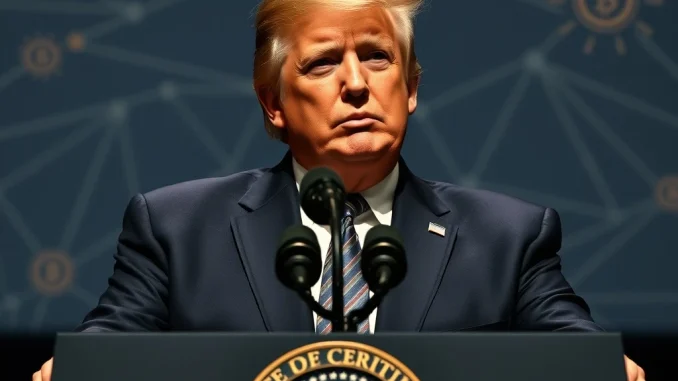
The cryptocurrency world is abuzz with groundbreaking news straight from the highest office. In a surprising and swift development, U.S. President Donald Trump has declared that the Stablecoin Regulation Act, widely known as the GENIUS Act, is set to pass tomorrow. This announcement sends ripples through the digital asset landscape, signaling a potentially seismic shift in US crypto policy and setting the stage for unprecedented clarity in the market.
According to the widely followed Walter Bloomberg economic news account on X, President Trump reportedly engaged with key “holdouts”—individuals previously opposed to the bill—and successfully convinced them to lend their support. This last-minute lobbying effort underscores the administration’s commitment to advancing crypto legislation, particularly concerning stablecoins, which have long been a focal point of regulatory discussions.
Trump Crypto: A Pivotal Moment for Digital Assets?
The President’s statement marks a critical juncture for the burgeoning digital asset industry. For years, the lack of clear regulatory frameworks has been a significant hurdle for innovation and mainstream adoption in the United States. While the specifics of the GENIUS Act remain under wraps until its official passage, the mere fact of a presidential endorsement and imminent approval suggests a concerted effort to bring structure to the volatile crypto market.
This development follows a crucial procedural step taken by the House, which earlier passed a motion necessary to advance both the GENIUS Act and the Digital Asset Market Structure Act, or the CLARITY Act. This dual progression indicates a comprehensive approach to regulating not just stablecoins, but the broader digital asset ecosystem. The political maneuvering behind the scenes, culminating in the reported conversion of opposing lawmakers, highlights the growing recognition of cryptocurrencies’ importance in the global financial landscape.
Understanding the GENIUS Act: What is Stablecoin Regulation?
At its core, the GENIUS Act is designed to provide a regulatory framework for stablecoins. But what exactly are stablecoins, and why do they need regulation?
- What are Stablecoins? Stablecoins are a type of cryptocurrency designed to minimize price volatility. They achieve this by pegging their value to a more stable asset, such as the U.S. dollar, gold, or a basket of fiat currencies. They serve as a bridge between traditional finance and the crypto world, facilitating transactions, lending, and trading.
- Why Regulate Them? The primary motivations for stablecoin regulation include consumer protection, ensuring financial stability, and preventing illicit activities. Regulators aim to ensure that stablecoins are adequately backed by reserves, transparently managed, and resilient to market shocks. Without clear rules, there’s a risk of investor loss, systemic financial risks, and their use in money laundering or terrorist financing.
While the exact provisions of the GENIUS Act will become clear upon its passage, it is anticipated to address key areas such as reserve requirements, auditing standards, redemption mechanisms, and potentially licensing for stablecoin issuers. Such regulations are crucial for fostering trust and encouraging broader adoption of digital currencies in everyday transactions and institutional finance.
The Road to Passage: How US Crypto Policy is Evolving
The swift movement of the GENIUS Act through the legislative process is indicative of a broader shift in US crypto policy. For a long time, the U.S. has been criticized for its fragmented and uncertain approach to digital asset regulation, often lagging behind other jurisdictions.
This new legislative push suggests a more proactive stance, potentially aiming to cement the U.S.’s position as a leader in the digital economy. The procedural motion passed in the House, which cleared the way for both the GENIUS and CLARITY Acts, underscores a bipartisan, or at least broadly supported, effort to bring regulatory certainty to the crypto space. The success in swaying ‘holdouts’ demonstrates a concerted political will to move these bills forward, overcoming previous impasses.
This legislative momentum could pave the way for increased institutional investment, clearer guidelines for businesses operating in the crypto sector, and ultimately, a more mature and secure market for all participants.
Beyond GENIUS: The Broader Impact of Crypto Legislation
It’s important to remember that the GENIUS Act is not operating in a vacuum. Its companion, the Digital Asset Market Structure Act, or the CLARITY Act, aims to provide a comprehensive framework for the broader digital asset market. This includes defining which assets fall under the purview of the SEC (as securities) versus the CFTC (as commodities), and establishing rules for exchanges, brokers, and custodians.
Together, these pieces of crypto legislation could:
- Provide Regulatory Clarity: Ending the long-standing ‘regulation by enforcement’ approach and offering clear rules for market participants.
- Foster Innovation: By providing a predictable environment, businesses can innovate without constant fear of regulatory crackdowns.
- Enhance Consumer Protection: Establishing safeguards for investors and users of digital assets.
- Strengthen US Competitiveness: Positioning the U.S. as an attractive jurisdiction for crypto businesses and talent.
The combined effect of these acts could lead to a more robust, secure, and globally competitive U.S. digital asset market, attracting both domestic and international investment.
What’s Next for Stablecoins and the Digital Economy?
The impending passage of the GENIUS Act could have profound implications. For stablecoin issuers, it means adhering to new standards, potentially involving more rigorous audits and capital requirements. For users, it could mean increased trust and stability when using stablecoins for payments, remittances, or as a store of value.
This landmark moment for Trump crypto policy suggests a future where digital assets are more integrated into the mainstream financial system, operating under clear, enforceable rules. It’s a significant step towards legitimizing the crypto industry in the eyes of traditional finance and the broader public.
Summary: President Trump’s announcement that the GENIUS Act, a crucial piece of stablecoin regulation, will pass tomorrow marks a watershed moment for the crypto industry. Coupled with the progress of the CLARITY Act, this signals a determined effort to establish a clear and comprehensive US crypto policy. This proactive stance on crypto legislation promises to bring much-needed clarity, foster innovation, and enhance consumer protection, potentially solidifying the U.S.’s leadership in the global digital economy. The swift passage, reportedly aided by President Trump’s direct engagement with ‘holdouts,’ underscores the urgency and significance of this legislative push for digital assets.
Frequently Asked Questions (FAQs)
1. What is the GENIUS Act?
The GENIUS Act, or the Stablecoin Regulation Act, is a proposed U.S. federal legislation aimed at establishing a comprehensive regulatory framework for stablecoins. It is expected to address aspects like reserve requirements, auditing, and licensing for stablecoin issuers to ensure stability and consumer protection.
2. Why is stablecoin regulation important?
Stablecoin regulation is crucial for several reasons: it protects consumers by ensuring stablecoins are adequately backed, reduces financial stability risks by preventing systemic failures, and combats illicit financial activities like money laundering. It also fosters trust, which is essential for the broader adoption of digital assets.
3. How will this impact the broader crypto market?
The passage of the GENIUS Act and the CLARITY Act is expected to bring significant regulatory clarity to the U.S. crypto market. This could lead to increased institutional investment, clearer operational guidelines for crypto businesses, and enhanced consumer confidence, potentially driving innovation and mainstream adoption of digital assets.
4. What is the CLARITY Act?
The CLARITY Act, or the Digital Asset Market Structure Act, is a companion bill to the GENIUS Act. It aims to establish a broader regulatory framework for the entire digital asset market, including defining jurisdictional lines between regulatory bodies (like the SEC and CFTC) and setting rules for crypto exchanges, brokers, and custodians.
5. Why is President Trump pushing for this now?
While the exact motivations are multifaceted, President Trump’s push for this legislation signals a recognition of the growing importance of digital assets and the need for the U.S. to establish a leading position in the global digital economy. It also reflects a desire to provide regulatory certainty to a rapidly evolving sector.
6. When is the GENIUS Act expected to pass?
According to President Trump’s statement, the GENIUS Act is expected to pass tomorrow. This indicates a very rapid legislative process, likely due to prior groundwork and a concerted effort to overcome any remaining opposition.



